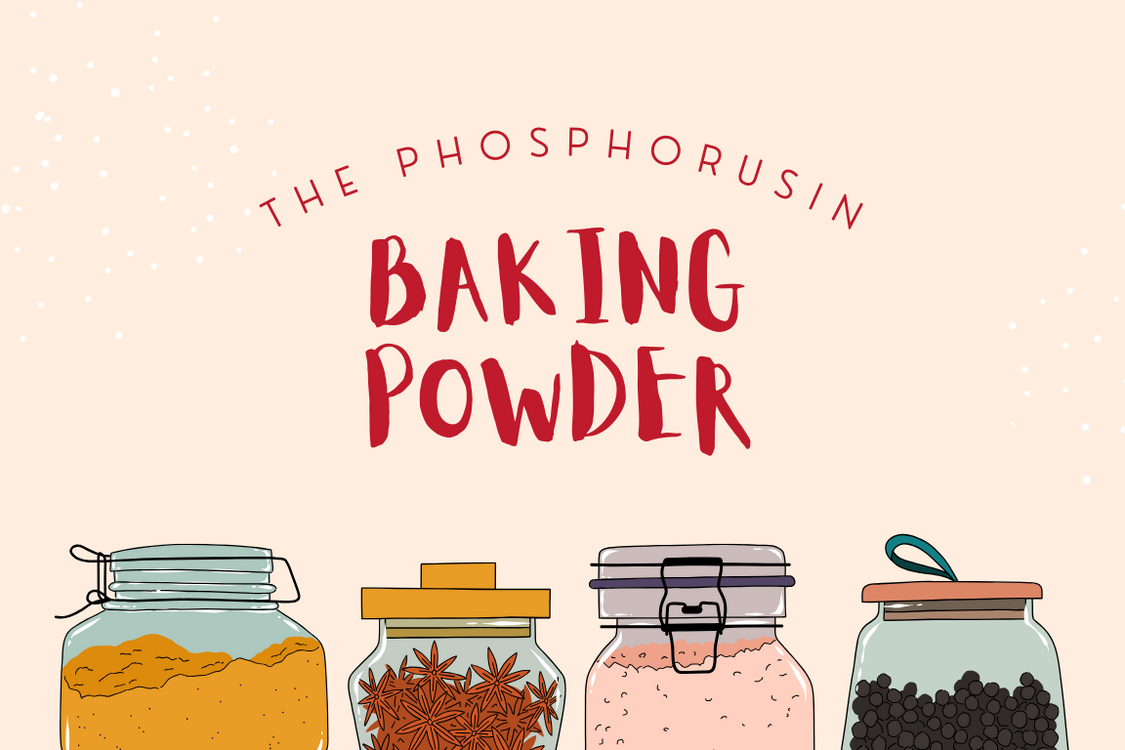I was asked a question about baking powder this week. The dietitian was wondering if they needed to worry about baking powder and it’s impact on serum phosphorus levels for adults living on hemodialysis (HD).

How much phosphorus is in baking powder?
Most baking powder’s that I have seen for sale in Canada contain phosphate additives. In fact, the last time I looked in my local grocery store I couldn’t find one without phosphate additives in the baking aisle. However, if you or your patient are using a baking powder without phosphorus additives – then this post doesn’t apply.

I checked two sources for information on the phosphorus content – The Canadian Nutrient File and the USDAs Food Data Central. Though interestingly, when I googled it, a third source from the Rochester Medical Center also came up.
| Source | Phosphorus amount per teaspoon |
| Canadian Nutrient File | 466mg |
| USDA Food Data Central | 456mg |
| Rochester Medical Center | 228mg |
So the Canadian and American data are pretty close – I am not sure why the Rochester Medical Center information is so different and unfortunately their source isn’t referenced.
But how much phosphorus would that add in a recipe?
Ok, let’s estimate that about 450mg of phosphorus per teaspoon will be added to a recipe from baking powder. Our next step is to figure out how much phosphorus that adds to each item (e.g. each muffin, pancake or biscuit). Obviously it depends on the recipe but here are some based on some of the top rated recipes on the internet.
UPDATED: I added the sodium content too – for comparison with my other post on phosphorus-free baking powder substitutes. For that calculation I used the Canadian Nutrient File sodium content of 370mg per teaspoon (5g)
| Recipe | Baking Powder | Yields | P* in recipe | P* per svg | Na* in recipe | Na* per svg |
| Pancakes | 3.5 teaspoons | 8 pancakes | 1575mg | 197mg | 1295mg | 162mg |
| Biscuits | 1 tablespoon | 6 biscuits | 1350mg | 225mg | 1110mg | 185mg |
| Blueberry Muffins | 2 teaspoons | 8 muffins | 900mg | 113mg | 740mg | 93mg |
| Chocolate Cake | 2 teaspoons | 24 slices | 900mg | 38mg | 740mg | 31mg |
| Waffles | 4 teaspoons | 10 waffles | 1800mg | 180mg | 1480mg | 148mg |
How does that compare to other high phosphorus foods?
In this 2012 article published in the Journal of Renal Nutrition, the phosphorus content of different foods was determine using chemical analysis. The authors also used enzyme digestion (think like test tube digestion simulation) to estimate how much of the phosphorus in the food was digestible or bioavailable.
While the authors didn’t specifically look at baking powder, the looked at commercially prepared baking goods containing baking powder and other important phosphorus sources, such as dark colas.
The reported that dark colas contained 11-19mg of phosphorus per 100g. Made into a serving size that I think most people drink (350g) that would be about 45mg of phosphorus. This phosphorus was 100% digestible.
The phosphorus from the commercial prepared muffins was reported to be 212mg per 100g and was 95% digestible.
So does the phosphorus content from baking powder in baked goods matter?
I think the math suggests it does. My caveats to that are:
- It depends on how much and how frequently they eat these baked goods
- It will depend on the recipes they are using
- It depends on their serum phosphorus levels
What can we do about it?
For my patients that have the energy, resources and ability to make their own homemade baked goods, I will ask them if they would be willing to make their own baking powder and I give them this recipe.
The ingredients are baking soda and cream of tartar. I admit though I have never tried it. Has anyone out there tried it? Can anyone comment on the quality of the final product or the taste?



I haven’t tried it either but my concern is that you replace 1 thing for something else, ie: take out the phosphorus but add in a lot of sodium. I agree with what you suggested, see how often its used and decide which is best for your patient.
Sharon! That is an excellent point. Now you are making me want to do some more math and figure out how the homemade baking powder combo would compare for sodium content.
According to the Canadian Nutrient File – 1 tsp of Cream of Tartar has 2mg of sodium. A tsp of baking soda 1284mg. BUT cream of tartar contains 505mg of potassium per tsp! YIKES!!!
OK this is going to need to be it’s own post! I am going to need to run the numbers like I did for phosphorus. We may need our patients to choose between the lesser of two evils!
I wanted to share another comment/resource I received after writing this post. Here is an article from a UK Kidney Group about kidney-friendly baking. https://www.kidneycareuk.org/about-kidney-health/living-kidney-disease/kidney-kitchen/kidney-friendly-baking/